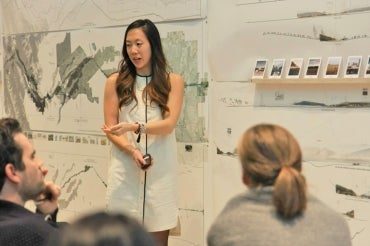Future city builders: Shelley Long

Published: November 24, 2016
They're the new generation of Toronto city builders. Meet the ambitious University of Toronto students and recent grads poised to become big players in shaping urban identity and city development.
U of T News writer Romi Levine continues the Future City Builders stories with a profile of U of T alumna Shelley Long, a landscape designer in Vancouver.
Whether it’s the hint of greenery between skyscrapers or a leafy inner-city courtyard – there’s an art to finding the balance between the built and natural environments in a city.
It’s this interaction that drew Shelley Long to landscape architecture.
“With landscape projects, the day you finish building your project, it starts to grow and change. Whereas, with buildings, the day you finish your project, they start to deteriorate in a sense,” says Long, who received her master's in landscape architecture from the University of Toronto’s John H. Daniels Faculty of Architecture, Landscape, and Design.
For her thesis, Long explored these notions of native versus invasive landscapes by re-imagining the Trans-Canada Highway between Calgary and Banff as Canada’s next national park.
“Along the way you experience a spectrum of different human ecologies from the city to an industrial cement mine to agricultural fields to First Nations reserves, which are very Canadian landscapes – and finally, the national park itself,” she says.
Long currently works for Hapa Collaborative, a landscape architecture and design firm in Vancouver.
At Hapa, she’s been able to work on a range of different projects – from residential developments to revitalizing areas of the Simon Fraser University campus.
But it’s the art installation projects that she talks about most enthusiastically.
This year, she was part of a team who designed and created a giant megaphone in a west-end Vancouver plaza. The sculpture, called “Speaker’s Corner,” (pictured below) pays tribute to Jim Deva, an active community member and LGBTQ advocate.

“That was a whirlwind process, but it was really exciting to start a project and see it built in a span of 2 1/2 months,” says Long.
“People put boom boxes behind it. Musicians perform inside it,” she says. “It’s been a really successful centrepiece of that part of the west-end.”
Having lived both in Toronto and Vancouver, Long has observed the cities’ different approaches to city building.
“Vancouver is very outward-focused city in that we are blessed with this abundance of scenery and natural life,” she says. “Our architecture and our built environment definitely reflect that. Our sea wall is the most important public space in the city.”
“Toronto is a much more inward-focused city in that it really loves itself,” says Long. “I don’t say that in a bad way. I say that in a way that it really celebrates its identity. It’s much more culturally focused. It’s much more multicultural. That really comes across in the built landscape.”
Long says Vancouver can learn from Toronto’s rethinking of the waterfront and ravines with an emphasis on landscape architecture.
“We’re saying how can we reintegrate these waterfront spaces and give them back to the public in really interesting ways and develop them into new communities. Likewise, how can we naturalize our streams to make more resilient storm water systems.”
She hopes to see similarly bold perspectives on city building in Vancouver.
“It’s starting to happen, but it’s a long process.”



